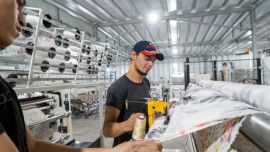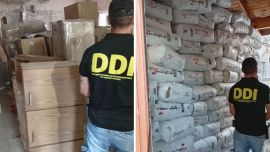Today is Independence Day in the United States with Argentina following suit this coming Thursday before our next edition – perhaps reason enough to make independence as good an editorial theme as any in this first week of recycled strict quarantine here in Buenos Aires.
Independence Day this year is more complex than usual for the US with its domestic leadership up for grabs in a few months’ time and its world leadership more uncertain than ever, except perhaps where it desires it least – in reported cases and deaths from coronavirus. Washington’s global leadership is under threat today for both external and internal reasons – from the pandemic crisis and the more permanent challenge of China, but also from the “America First” thrust of the Donald Trump presidency reviving an isolationism which had seemed extinct after Pearl Harbor and almost half a century of Cold War. Yet the underlying questions here of whether isolation is the best expression of independence are valid for both ends of the hemisphere.
The presidential debut at the Mercosur regional summit last Thursday was fraught with all the complexities and contradictions between a rising nationalism and a fading multilateralism. At odds with the main Mercosur partner Brazil, President Alberto Fernández was more than physically isolated at the virtual session, appealing for regional unity but declaring himself alone within Latin America in seeking to change a wider world apart from Mexico’s Andrés Manuel López Obrador (whose approach to pandemic quarantine has been diametrically opposite).
Within this context quarantine becomes almost a comfort zone as a metaphor for a deeper isolationism. The pandemic is a curious ally of ultra-nationalism, feeding the notion that Covid-19 will destroy globalisation and the private sector in a world dictating a self-sufficiency of which very few countries (perhaps only Argentina, Russia and maybe also the US, thanks to shale) can even dream. This June saw the word “sovereignty” become the flavour of the month with the proclamation of “food sovereignty” accompanying the announcement of the Vicentin nationalisation in the second week, LATAM’s exit from Argentina in the third week opening up the vista of an Aerolíneas Argentinas monopoly establishing sovereignty over the skies, the Malvinas claim being reiterated anew and then Economy Minister Martín Guzmán opening up the last week by claiming Argentina to be well on the road to “monetary sovereignty.” Meanwhile in the background there are plans afoot to keep Vaca Muerta shale alive as a cash cow to ensure energy self-sufficiency (and gas this winter in a shorter term). All a suitable crescendo towards Independence Day next Thursday.
Yet the paradox of this triumph of nationalism over a globalisation shattered by the pandemic is that this new independence of the nation state gained by default also translates into the intensified dependence of its citizenry. At the close of the first two months of quarantine the Social Development Ministry could hardly conceal a tone of pride when it announced that 89 percent of all households depended in whole or in part on the state – almost as if this were the objective.
The Frente de Todos government clearly has an ambitious agenda of state intervention which some of its more ideologically driven members would like to carry to totalitarian extremes while others fear that these extremes may be reached by sheer force of events but we still live in a democracy – the United States will be voting in November while there is no reason to believe that Argentina will not be holding midterms next year (especially looking at the preparations already underway in some circles even if still 15 months away, somewhat insensitively given a raging pandemic).
Democracy ultimately depends not on political ambitions but on its building-blocks, the individual citizen and voter, but at this level the future of democracy remains uncertain because this duality of independence and dependence exists within most people. On the one hand, modern technology has opened up a quasi-independence with one smart gadget enabling each person to retreat into a world of their own – in this sense quarantine is a suitable metaphor for not only nationalistic isolationism but also an autistic technology. But on the other end, faced with the threats to employment posed by that very technology along with all the uncertainties of a fragmented world now heightened by pandemic, all too many people would make their maximum aspiration some fixed stipend even at the price of dependence – maybe not 89 percent but millions upon millions. Let us start thinking long and hard about independence both today and next Thursday.






















Comments